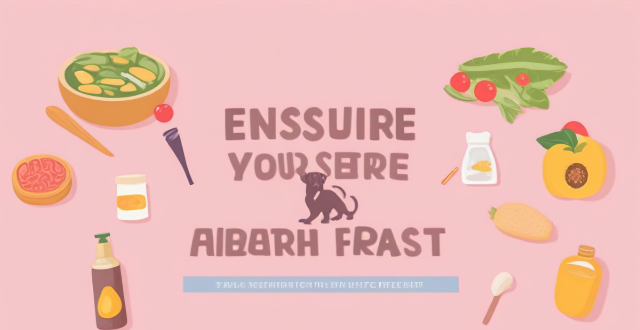To ensure your pet's health, it is crucial to provide the right food and nutrition. Understanding your pet's species-specific dietary requirements, choosing high-quality pet food, supplementing with fresh foods, monitoring your pet's weight and health, and staying informed about pet nutrition research are key aspects to consider. Tailor your pet's diet to their individual needs for a long and healthy life.

What Kind of Food and Nutrition Should I Provide for My Pet to Ensure Its Health?
Providing the right food and nutrition is crucial for your pet's overall health and well-being. Here are some key points to consider when choosing the best diet for your furry friend:
1. Understand Your Pet's Nutritional Needs
Species-Specific Dietary Requirements
- Dogs: They require a balance of proteins, fats, carbohydrates, vitamins, and minerals.
- Cats: They need more protein in their diet compared to dogs and have specific requirements for amino acids like taurine.
- Birds: Their dietary needs vary widely depending on the species, with some requiring seeds, others needing fruits and vegetables, and some needing a mix of both.
- Small Mammals (e.g., Guinea Pigs, Hamsters): They often require fresh veggies and high-quality hay or grass.
Life Stage Considerations
- Puppies and kittens need higher levels of energy and nutrients for growth.
- Adult pets require maintenance levels of nutrients.
- Senior pets may benefit from lower calorie diets with added supplements like glucosamine for joint health.
2. Choose High-Quality Pet Food
Read the Label
- Look for AAFCO (Association of American Feed Control Officials) nutritional adequacy statements.
- Check for named protein sources (e.g., "chicken" instead of "poultry").
- Avoid foods with excessive fillers like corn or wheat gluten.
Wet vs. Dry Food
- Wet food can provide more moisture and may be tastier for picky eaters.
- Dry food aids in dental health by scraping plaque off teeth.
Special Diets
- Some pets may require hypoallergenic or prescription diets due to allergies or health conditions.
3. Supplement with Fresh Foods and Treats
Safe Fruits and Vegetables
- Dogs: Apples (without seeds), blueberries, carrots, green beans, and spinach.
- Cats: Steamed broccoli, cooked eggs, sardines, and small amounts of lean meat.
Unsafe Foods
- For Dogs and Cats: Grapes, raisins, onions, garlic, chocolate, avocado, macadamia nuts, and alcohol.
4. Monitor Your Pet's Weight and Health
Regular Check-Ups
- Visit your vet annually to monitor your pet's weight and adjust their diet accordingly.
- Discuss any changes in appetite or behavior with your vet.
Portion Control
- Use measuring cups to ensure accurate serving sizes.
- Avoid overfeeding, which can lead to obesity and related health issues.
5. Stay Informed About Pet Nutrition Research
Keep Learning
- Stay updated on new research and recommendations through reputable sources like veterinary journals and websites.
- Be wary of fad diets; always consult with a vet before making significant changes to your pet's diet.
By following these guidelines, you can help ensure that your pet receives the proper nutrition to support a long, healthy life. Remember, every pet is unique, so it's essential to tailor their diet to their individual needs.